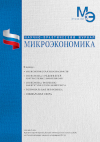Risk management system in international supply chains under conditions of change
DOI: 10.33917/mic-3.122.2025.15-28
This article examines the methodological aspects of the formation of a risk management system in international commodity supply chains in modern socio-economic conditions. The paper considers the impact of the following risk groups in international commodity supply chains: static (simple), dynamic (speculative) risks, diversification, dissipation, hedging, risk transfer, supplier risks and risks of geopolitical instability.
The issues of risk prevention and mitigation are becoming more and more in demand in international supply chains. Russian companies are forced to take risks in order to achieve their goals, and risk management is designed to optimize the set of risks. In conditions where market economy actors risk not only their own, but also a large number of borrowed funds, the consequences become more acute. In case of failure, not only Russian companies lose, but also their economic infrastructure, in particular, counterparties. That is why Russian companies should pay great attention to the introduction of effective risk management, thanks to which it is possible to identify emerging risks and opportunities in a timely manner, as well as respond to them in a timely manner.
References:
1. Afendikova E.Yu., Ksenzhuk A.N., Kovaleva V.I. Risk management tools in crisis management of a modern enterprise: identification and classification of risks. In the collection: Eurasian Science. Moscow, 2024. pp. 453-455.
2. Bobrova A.V. Factor analysis of the effectiveness of international commodity supply chains. In the collection: Problems of economic security and customs regulation: the search for effective solutions. South Ural State University. 2023. pp. 30-43.
3. Klimashevich S.V. Digitalization of transport corridors as a promising tool for the development of international supply chains. In the collection: Logistics – the Eurasian bridge. Krasnoyarsk, 2021. pp. 322-325.
4. Kopylova O.A., Mishkurov P.N. Designing a supply chain taking into account the risks of organizing international transportation and general logistical costs. In the collection: Polytransport systems. Novosibirsk, 2024. pp. 103-108.
5. Kostioglo V.Kh., Titovets M.I., Titovets E.I. Supply chain management in conditions of international economic instability. Economics: yesterday, today, tomorrow. 2024;14(4-1):796-805.
6. Mesharova E.Y. The impact of sanctions on international supply chains. In the collection: Innovative aspects of service and tourism development. Collection of articles of the VIII International Scientific and Practical Conference. 2020. pp. 75-79.
7. Mishchishina A.N. Directions of restructuring international supply chains as a basis for socio-economic development of Russia. In the collection: A young researcher. Lipetsk, 2024. pp. 436-439.
8. Mitko O.A. A modern view on the development and planning of supply chains: an international aspect. In the collection: Creative logistics: strategies and technologies. Rostov-on-Don, 2024. pp. 88-92.





